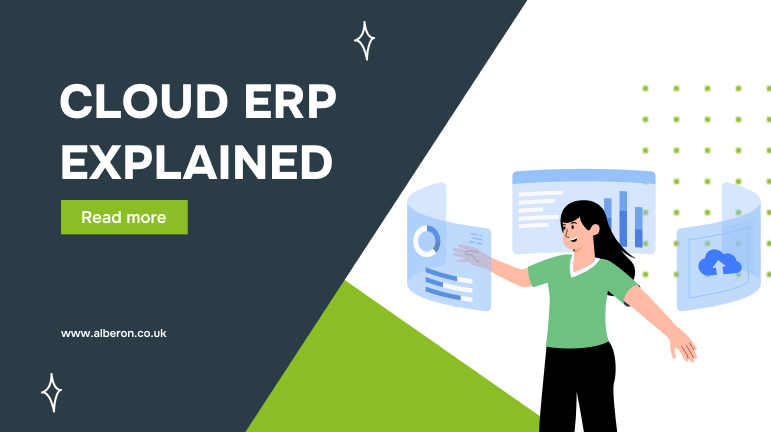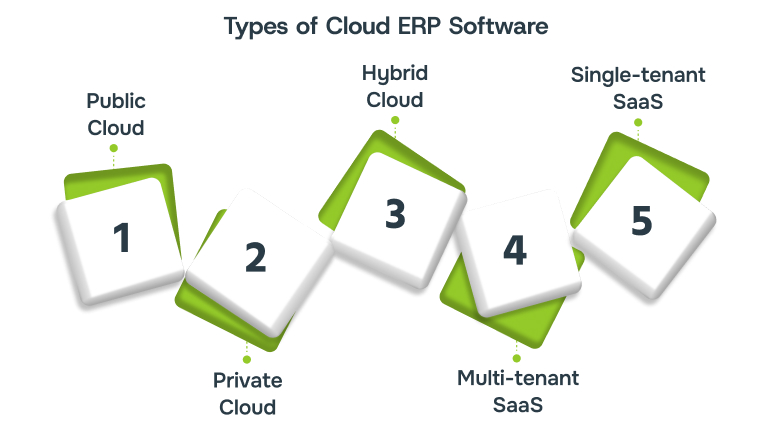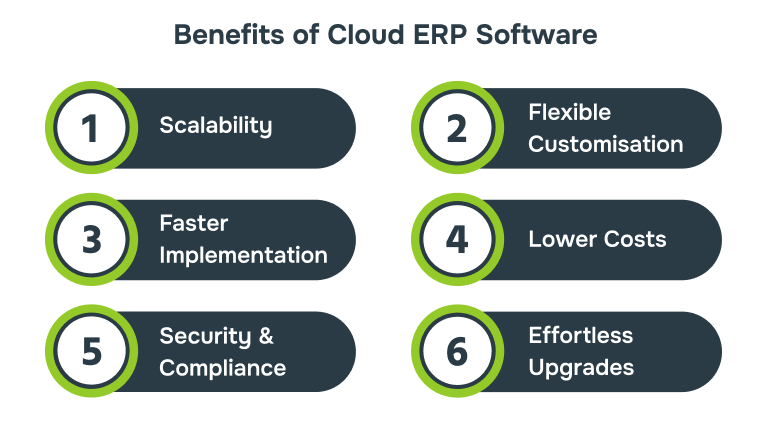Cloud ERP Explained: What It Is and How It Works?
Discover how cloud and ERP centralize operations, reduce costs, and support remote work. Unlock business growth with scalable, efficient solutions. Click now!

You’re in the middle of a critical task when your spreadsheet crashes again. Well, yes, it’s a frustrating scenario that highlights a larger issue. This is because many businesses still rely on outdated software and manual processes, which lead to delays, reduced productivity, and unnecessary stress. Legacy systems slow operations, limit efficiency, restrict growth, and make digital transformation harder to achieve. These challenges can significantly hold your business back.
That’s where an ERP (Enterprise Resource Planning) system comes in. ERP is a type of software that helps businesses manage core functions like finance, inventory, procurement, and operations through a unified platform. Instead of managing disconnected systems and spreadsheets, ERP consolidates data and workflows to improve visibility and coordination across departments.
Cloud ERP is a type of enterprise resource planning system hosted on a vendor’s cloud platform, enabling users to access it anytime, anywhere via a web browser. It brings together core business functions, such as inventory, supply chain, finance, and procurement, into a single system. It offers real-time data and streamlined automation across operations.
Here’s everything you need to know about Cloud and ERP, how it works, and how it can transform your business.
What Is Cloud ERP Software?
Cloud ERP is hosted and maintained by the vendor, offering the same functionality as traditional on-premises systems without the typical drawbacks of high upfront licensing costs.
According to reports, 87% of UK eCommerce organisations utilise cloud-based or hybrid ERP systems, yet 64% feel that the cloud remains an underutilised resource.
According to IDC, “demand for cloud-based ERP systems continues to grow because of their ability to access and analyse massive amounts of data in near real time.”
This means sales teams can tap into real-time inventory insights, while finance teams gain greater visibility into cash flow and can respond quickly to audits or performance reviews.
Importance of Cloud ERP for Businesses
For businesses, ERP systems are the backbone of operations. A strong cloud and ERP solution extends beyond basic functions by automating processes, providing AI-driven insights, and facilitating innovation across diverse business models.
Here’s why more companies are shifting to cloud-based ERP:
1. Greater Cash Flow Visibility
Cash flow is critical for companies, where leadership is typically very cost-conscious and focused on margin improvement.
- Cloud ERP connects accounting with operational functions, offering a complete financial picture.
- It supports better management of working capital, expenses, and investments.
- Unlike basic accounting software, cloud ERP delivers real-time cash flow and profitability insights and scales with business needs.
2. Improved Agility
Companies, particularly those in niche industries such as professional services, often need to move quickly. Whether it’s expanding to new locations, launching new products, acquiring competitors, or reacting to market changes.
- Legacy systems lack the flexibility and speed needed to support rapid growth.
- Cloud ERP enables real-time decision-making by providing quick access to accurate data.
- It breaks down silos created by disconnected tools and manual workarounds like spreadsheets, fostering better collaboration and faster execution.
3. Easier Integration with Other Applications
Businesses often adopt standalone tools for specific needs, but these point solutions don’t always connect well with outdated ERP systems.
- Traditional “bolt-on” approaches increase cost and complexity.
- Cloud ERP makes integration with systems like CRM, customer support, or field service easy.
- It provides built-in scalability and flexibility, allowing businesses to grow without tech limitations.
Types of Cloud ERP Software

Not all Cloud ERP solutions are created equal. Depending on your business size, industry, and specific needs, various types of Cloud ERP solutions are available.
- Public Cloud: Cloud services are owned and managed by a provider, with multiple organisations sharing computing resources, such as storage and servers. Each organisation’s data and applications remain private. Common public cloud platforms include Amazon Web Services (AWS), Google Cloud, Microsoft Azure, and Oracle Cloud.
- Private Cloud: In a private cloud setup, the customer owns the infrastructure while the service provider handles its management. Although typically more expensive than public clouds, private clouds offer enhanced security and control. They are especially suited for organisations that handle sensitive data, such as those in the healthcare or financial sectors. Since the environment is not shared with other customers, maintaining data confidentiality and regulatory compliance is easier.
- Hybrid Cloud: This approach combines on-premises ERP systems with cloud-based services, whether public or private. It allows businesses to keep critical systems in-house while benefiting from the scalability and flexibility of the cloud for other functions.
Example: A company might use Microsoft Dynamics 365 Finance in the cloud while running its SCM module on-premises to maintain control over sensitive supply chain operations. This hybrid setup lets the company modernise financial operations with cloud benefits while keeping production tightly controlled on-site. - Multi-tenant SaaS: This model uses a single version of the ERP software and infrastructure to serve multiple organisations. While they all share the same system and servers, each company’s data remains completely separate and secure. Most true cloud ERP solutions follow this approach.
Example: NetSuite ERP is a popular multi-tenant SaaS solution used by thousands of businesses worldwide on a shared cloud platform. - Single-tenant SaaS: In this setup, the ERP software and infrastructure are dedicated to one organisation. The company’s data is hosted on private servers with its own instance of the software. Some vendors allow customers to choose between single-tenant and multi-tenant options.
Example: SAP S/4HANA Cloud, private edition is a popular single-tenant ERP solution. It offers a dedicated environment tailored to each customer’s needs, allowing for deeper customisation, enhanced security, and compliance with industry-specific regulations.
The key is to choose the solution that aligns with your business goals, growth trajectory, and security requirements.
How Does Cloud ERP Work?
Cloud ERP integrates various business functions into a single, cloud-hosted platform. This allows for real-time access to data and reports, ensuring that everyone across the organisation is working with the same information. Here’s how it works:
- Internet-Based Access: Cloud ERP operates on the provider’s cloud infrastructure and is accessible via a high-speed internet connection, eliminating the need for on-site servers.
- Automatic Updates & Security: The ERP vendor manages system updates and security patches, reducing IT overhead and ensuring up-to-date protection.
- Low Maintenance & Cost Efficiency: Lower total cost of ownership compared to traditional, on-premise ERP systems, as there’s no need for hardware maintenance or manual upgrades.
- Anywhere, Anytime Access: Accessible from both desktop and mobile devices, allowing teams to work from offices, remote sites, or home, ideal for hybrid work environments.
- Scalability: Cloud ERP solutions can easily scale with business growth, adapting to more users, locations, or expanded operations without major reconfiguration.
- Comprehensive Business Applications: Includes integrated tools for:
- Customer relationship management (CRM)
- Financial and accounting
- Sales and order tracking
- Inventory and supply chain visibility
- Human resources and payroll
- Real-time operational metrics
- Customisable Modules: Deployment can be tailored with industry-specific modules and settings, helping teams stay focused on relevant workflows and KPIs.
By utilising cloud technology, Cloud ERP ensures your business is not only efficient but also future-proofed to handle the demands of growth and innovation.
8 Components of Cloud ERP System
Cloud ERP software typically consists of several key components designed to streamline and automate various business functions. These include:
- Financial Management: It helps businesses track and analyse transactions such as accounts payable and receivable, general ledger entries, budgets, and forecasts. Advanced features may also include tax calculation, fixed asset tracking, and managing multi-currency reconciliations.
Since ERP systems integrate across departments, this component ensures finance teams have accurate, real-time data from across the business. It automates functions like billing, revenue recognition, and financial reporting, reducing manual work and improving accuracy. This enables financial teams to close books faster and generate insightful reports for better decision-making. - Supply Chain Management (SCM): SCM tools manage the entire lifecycle of a product, from sourcing raw materials to final delivery. Within an ERP, this includes tracking shipments, monitoring inventory flow, managing suppliers, and handling returns.
Many ERP systems break down SCM into smaller components, such as procurement, order management, and logistics, allowing companies to customise their systems based on specific supply chain needs. This improves visibility, coordination, and responsiveness across the supply chain. - Customer Relationship Management (CRM): CRM functionality captures and manages customer and prospect data. This includes contact info, sales history, and support records in one place. Sales, marketing, and support teams use this data to improve customer interactions, identify sales trends, and automate processes like lead tracking and pipeline management.CRM tools also assist service teams with ticket management, ensuring faster, personalised responses. The result is improved customer satisfaction, stronger relationships, and better retention.
- Human Resources (HR): The HR streamlines workforce management. It covers recruitment, onboarding, employee records, performance tracking, and payroll processing. It centralises employee data such as work hours, paid time off, and benefits, reducing errors from fragmented systems.By offering insights into performance and staffing needs, the HR component supports strategic tasks like workforce planning and succession management. This shifts HR from purely administrative to a more proactive, business-aligned function.
- Business Intelligence (BI): The BI module enables organisations to analyse data across all ERP functions, from finance to operations, to uncover trends and insights. It transforms raw data into dashboards and visual reports, making it easier to track KPIs and guide decisions.Advanced BI features may include predictive analytics, enabling businesses to anticipate outcomes and adapt their strategies accordingly. This empowers leaders to make informed decisions quickly and stay ahead of the competition.
- Inventory Management: This module helps businesses maintain optimal inventory levels and avoid overstocking or shortages. Real-time data enables companies to track stock levels, item locations, and SKU performance, informing smarter purchasing and restocking decisions.It also integrates with financial and warehouse data to calculate metrics like inventory turnover and COGS. Automated features, such as reordering and forecasting, improve accuracy and reduce manual tasks.
- Manufacturing and Logistics Management: Often grouped within SCM, this component focuses specifically on production and delivery. It helps plan manufacturing runs, manage materials, monitor quality, and oversee shipping logistics.For example, ERP systems can auto-generate Bills of Materials (BOMs) from design files, reducing errors and speeding up production planning. Real-time tracking and version control ensure teams stay aligned and agile throughout the manufacturing cycle.
- Warehouse Management: Focusing on stock movement within storage facilities, this component ensures warehouse operations run efficiently. It addresses warehouse layout, picking, packing, and shipping workflows.By analysing how items move through a warehouse, the system can highlight inefficiencies, such as poor layout or delayed handling, and suggest improvements. This results in faster order fulfillment, reduced waste, and better space utilisation.
These components are integrated into a unified system, reducing the need for multiple standalone applications and thereby improving efficiency and accuracy across your business.
Benefits of Cloud ERP Software

The shift to Cloud ERP offers a multitude of benefits, particularly for businesses looking to optimise their operations and improve productivity. Here are some key advantages:
- Scalability: Cloud ERP grows with your business. Add users, locations, or functions without the need for additional servers or major reconfigurations. New units can be brought online quickly, making them ideal for expanding operations or M&A activity.
- Flexible Customisation and Agility: Easily tailor your ERP system to meet changing business needs. Unlike on-premises solutions, cloud ERP customisations are easier to manage and preserve through upgrades. Integrations with other cloud apps are also simpler and more stable.
- Faster Implementation: Cloud ERP can be deployed more quickly than traditional systems since it doesn’t require setting up hardware or specialised IT teams. This leads to quicker time to value and minimal business disruption.
- Lower Upfront and Operating Costs: Cloud ERP eliminates the need for costly infrastructure like servers and reduces spending on IT staff, security, and maintenance. With no hardware to purchase or manage, businesses typically save around 30% compared to on-premises ERP systems.
- Enhances Security and Compliance: Cloud providers offer enterprise-grade security, encryption, and compliance with industry standards. They also maintain reliable disaster recovery plans, ensuring data is protected even in emergencies, something many in-house setups can’t match.
- Effortless Upgrades: Vendors handle system upgrades automatically, often during off-peak hours. This ensures your software stays current with minimal effort and avoids the disruption or cost typically associated with manual updates.
For businesses in sectors like manufacturing, finance, and education, adopting Cloud ERP can improve operational efficiency, reduce costs, and empower your teams with better tools to collaborate and innovate.
What are the Cloud ERP Challenges?
While the benefits of Cloud ERP are clear, there are some challenges to consider before making the switch.
| Challenge | Brief Description | Solution |
|---|---|---|
| Security Concerns | Risk of exposing sensitive data to third parties | Choose vendors with strong security certifications (e.g., ISO 27001, SOC 2); ensure integration with internal security systems |
| Lack of Control | Limited control over data stored on vendor-owned servers | Ensure vendor transparency; opt for customisable controls and monitoring tools |
| Vendor Lock-in | Switching providers is costly and complex | Review exit clauses in advance; prioritise vendors with flexible contracts |
| Resistance to Change | Team pushback during transition to the cloud | Communicate benefits; offer training, and involve stakeholders from the start |
| Migration Complexity | Legacy system migration can be slow and risky | Use a phased approach; engage experts; clean and validate data before moving |
At Alberon, we help businesses manage these challenges by providing expert consulting, seamless integration, and strong support to ensure a smooth transition to Cloud ERP.
How Alberon Helps Businesses Transition to Cloud ERP?
At Alberon, we specialise in helping UK businesses modernise their operations through secure, custom-tailored Cloud ERP solutions. Whether you’re a manufacturing company, a finance firm, or an educational institution, we understand the unique challenges each sector faces and offer bespoke solutions that align with your specific needs.
Our services include:
- Custom Microsoft Dynamics 365 ERP Implementations: We streamline your CRM and ERP processes with tailored Microsoft Dynamics 365 solutions designed to improve efficiency and data management. Our services include.
- CRM/ERP Customisation: Tailored configurations that align precisely with your business workflows.
- Process Automation: Automate repetitive tasks and approvals to increase productivity and reduce human error.
- System Integration: Smooth integration with your existing tools and third-party applications for unified operations and real-time data flow.
- Cloud Migration Services: Secure, reliable, and efficient migration from legacy systems to cloud-based platforms, ensuring minimal disruption.
- IT Consultancy: Expert advice on system performance, security, and compliance to align your ERP system with your business goals.
- Ongoing Support and Training: Comprehensive training and ongoing support to ensure your team maximises the value of your Cloud ERP system.
At Alberon, we provide comprehensive training and consultation services to ensure your team gets the most out of your Cloud ERP system. Our support doesn’t end at deployment; we stay with you every step of the way.
Conclusion
Cloud and ERP enable businesses to streamline operations, eliminate inefficiencies, and make smarter, data-driven decisions. With improved scalability, real-time collaboration, and unified systems, companies are better equipped to drive growth, stay competitive, and achieve long-term success. For businesses dealing with legacy systems, fragmented processes, or growing demands for scalability, Cloud ERP offers a powerful solution to streamline workflows, enhance collaboration, and boost overall efficiency.
Ready to learn more? Get in touch with Alberon today, and let us help you transform your business for the future.
Frequently Asked Questions
1. What does it mean to have ERP on the cloud?
Cloud ERP refers to Enterprise Resource Planning software that is hosted on a cloud computing platform rather than on local servers. This allows businesses to access the system via the internet from any location. It provides real-time data, automatic updates, and scalability, all without the need for heavy infrastructure or internal IT management.
2. Why are more businesses switching to cloud-based ERP systems?
Businesses are adopting cloud-based ERP for greater flexibility, lower upfront costs, and enhanced accessibility. Unlike traditional systems, cloud ERP can be accessed remotely, integrates easily with other applications, and offers faster deployment. It also helps organisations stay agile, scale efficiently, and reduce maintenance overheads.
3. How does cloud ERP differ from traditional on-premise ERP solutions?
Cloud ERP is hosted offsite by a vendor and accessed through the internet, whereas traditional ERP is installed on local servers within a company’s premises. Cloud ERP requires less IT support, has lower capital expenditure, and offers automatic updates. In contrast, traditional ERP offers more control but demands higher costs for maintenance, upgrades, and infrastructure.
4. Can you give a real-world example of an ERP system in use?
A common example of an ERP system is Microsoft Dynamics 365, which helps businesses manage finances, operations, supply chain, sales, and customer service from one integrated cloud platform. It’s widely used across industries like manufacturing, retail, and finance to improve decision-making and streamline workflows.
Get in Touch Today:
Ready to Improve your Business Productivity
Get a trusted partner to navigate your digital transformation. With Alberon, you can ensure a smooth transition, clear communication, and peace of mind.
